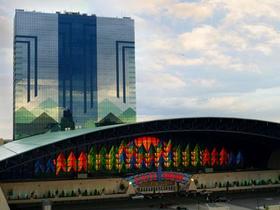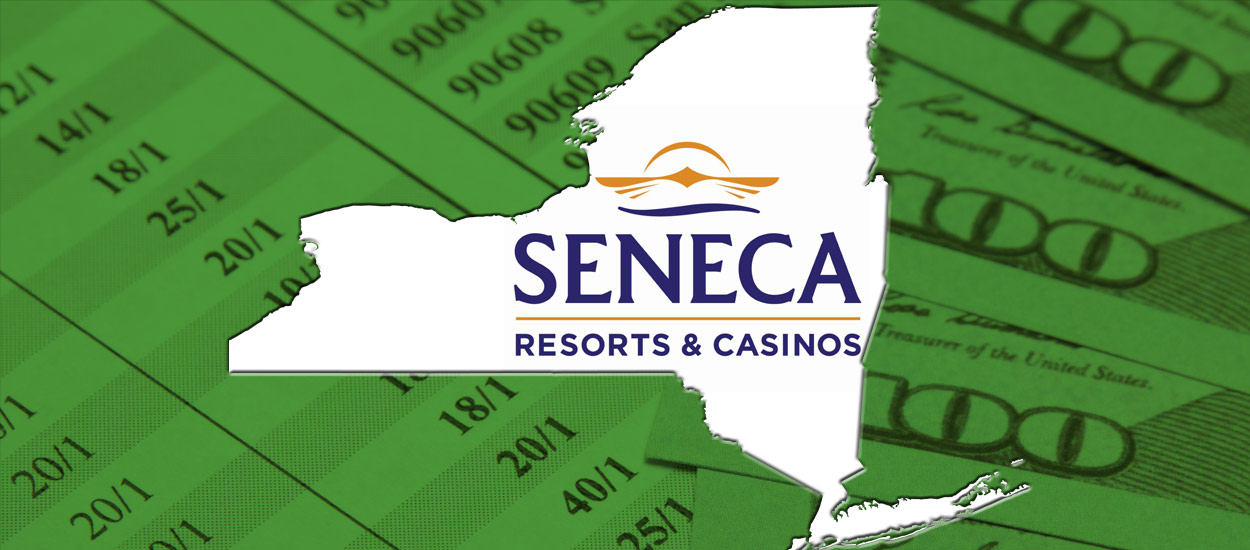The Seneca Nation has a big decision on offering sports betting in NY
Last week the New York legislature created rules which allowed the state to proceed with a decision made earlier to offer sports betting at land-based casinos. The agreement prohibits betting on New York college sports teams or tournaments that take place in New York and limits sports betting to four commercial land-based casinos located in Del Lago in the Finger Lakes, with DraftKings running the sportsbook; Resorts World Casino in the Catskill Mountains, with Bet365 running the sportsbook; Tioga Downs Casino Resort in Nichols, NY (which is on the New York/Pennsylvania border and is about a half hour drive from Binghamton), with Paddy Power-Betfair running the sportsbook; and at Rivers Casino & Resort in Schenectady near Albany, with no official sports betting partner announced. The agreement does not mention any Native American casinos, but an agreement signed in 2013 with the Seneca, Oneida and Mohawks had language that permitted Native American casinos operating in New York to offer sports betting, if it ever became legal at the commercial casinos. The Oneida tribe said it planned to start offering sports betting at the Turning Stone Casino in Verona, NY (a short drive from Syracuse) with Caesars acting as a sports betting partner and the Mohawk Tribe hinted they would start looking at sports betting at the Mohawk casino in Akwesasne, NY, although they have not indicated a sports betting partner.
The one Native American group that is still uncertain on their plans, at least publicly, is the Seneca Nation of Indians, which run casinos in Niagara Falls, Buffalo and Salmanca. A Seneca spokesperson indicated their casinos would likely offer a small amount of sports betting, but would not make it a priority and it would just be an addendum to what they currently offer. Most analysts, however, feel the Senecas are being untruthful about their disinterest and will host sizable sports betting operations in their Niagara Falls and Buffalo casinos, because not doing so would be foolish.  The Seneca Nation has exclusive rights to the three million people in Western New York, which extends from Rochester in the east to Buffalo in the west and from the Canadian border in the north to the Pennsylvania border in the south, and they generate almost exclusive interest in U.S. casinos from Greater Toronto residents, with a population over 5.5 million. Plus, of course, they get the traffic from the tourists to Niagara Falls that prefer to play at an American casino. So not offering a lucrative product to a potential population of over 10 million people would just be crazy. And now is the time to strike to attract Canadian sports bettors because of a law that prohibits single game betting in the country. It is estimated that over 1/3 of bettors at the Niagara Falls Seneca casino are Canadians who just prefer to play at a more relaxed and liberal casino than the ones in Niagara Falls, Ontario and that number would likely climb if sports betting was added.
The Seneca Nation has exclusive rights to the three million people in Western New York, which extends from Rochester in the east to Buffalo in the west and from the Canadian border in the north to the Pennsylvania border in the south, and they generate almost exclusive interest in U.S. casinos from Greater Toronto residents, with a population over 5.5 million. Plus, of course, they get the traffic from the tourists to Niagara Falls that prefer to play at an American casino. So not offering a lucrative product to a potential population of over 10 million people would just be crazy. And now is the time to strike to attract Canadian sports bettors because of a law that prohibits single game betting in the country. It is estimated that over 1/3 of bettors at the Niagara Falls Seneca casino are Canadians who just prefer to play at a more relaxed and liberal casino than the ones in Niagara Falls, Ontario and that number would likely climb if sports betting was added.
Jerry who lives in St. Catharines, Ontario and crosses the border almost every week to gamble at the Niagara Falls Seneca Casino explains why he goes to the New York casino over the Canadian counterpart.
“I'm a smoker which pretty much makes me an outcast in my country. Ontario has banned any public smoking, including at casinos, which is kind of funny, since we just allowed legal cannabis use and I hate the idea that I have to leave a game or slot machine to smoke outside. At the Seneca Casino I can smoke as I like. There is a non-smoking area at the casino for those who can’t tolerate the smoke, but they treat everyone in the casino like adults and if we choose to smoke, we can do so. I also get free alcohol, which for some reason isn’t allowed at Fallsview or other Ontario casinos. I like Black Russians and in a stint of 3 hours gambling I can easily drink 10 of those. They are given free of charge at the Seneca casino, but if I want to buy them at Fallsview it costs me around $7 each. It may not seem like a lot, but it’s a nice perk, and again I feel like I’m being treated like an adult."
No Single Game Betting in Canada
Along with those perceived freedoms, the law in Canada makes single game sports betting illegal. There have been numerous attempts by politicians to change that law, but for one reason or another it hasn’t passed. In 2012 the NDP sponsored a bill to allow sports betting in an effort to generate interest at the border city casinos. To change the law would require the striking of one sentence from the criminal code. It went to the House of Commons where all three Canadian political parties voted in favor. At that point the law would go to the Canadian Senate to rubber stamp it since the Senate is just a series of un-elected patronage appointments, but in light of a scandal the Senate chose to not sign the bill, giving ridiculous arguments and also to make themselves appear more relevant. The bill stalled and was not voted on again until a new political party took power. The bill was reintroduced and was voted down by the current Liberal government. As such, Canadians can only wager offshore, with illegal bookmakers or on parlay type sports betting lottery games where the payback is around 60%. Not surprisingly, at those odds, serious sports bettors avoid the sports lottery and many are uncomfortable sending money offshore. So, the ability to wager on sports at a legal land-based casino would certainly be quite attractive, particularly on NFL Sundays, for March Madness, etc. And many sports bettors will attest that there is nothing like the atmosphere of betting at a sportsbook in Las Vegas during major game days. And the current provincial governments know that and are begging the current Liberal government to reconsider as a matter of urgency. Many political analysts know that if the U.S. border casinos offer sports betting while the Canadian casinos don't, it's almost certain that many gamblers will cross the border to make their bets.
Seneca Nation has a tough decision
So why would the Seneca Nation of Indians not go full out to offer sports betting and attract new customers?
The answer is that they are currently in a long feud with the state of New York over revenues owed from a compact and they know full well that few sports betting partners will rush to their side until the feud is settled. In 2002 the Seneca Nation signed a 14 year compact with the state to offer gambling at three casinos in Western New York in exchange for 25% of gambling revenue going back to the state, who in turn shared some of that revenue with the municipalities hosting the casinos including Niagara Falls, Buffalo and Salmanca. The compact expired at the end of 2016 and neither side met to renew or amend it. According to the state, that silence automatically extended the compact for 7 years, as was written in the original compact, but the Seneca leaders argued that the fact there was no meetings prior to the compact expiring means that the compact ended and the Seneca nation owes the state nothing. Seneca lawyers also argued that the state violated the compact by allowing a casino at Batavia Downs racetrack in a suburb of Buffalo. The state in turn said that the compact only disallowed Las Vegas style resort casinos in Western New York, but agreed to allow a small amount of video gaming and slots at the racetrack and they took the word "casino" from Batavia Downs. It is now known as Batavia Downs gaming. The state also agreed that only Batavia Downs would be allowed to operate as a non-Seneca gambling operation in Western New York. Since 2016 the Seneca Nation hasn’t given a penny to the state (although they said they would be willing to give the host cities something) and the state asked for arbitration regarding the dispute which both sides agreed they’d abide by. A New York State court ruled in favor of the state and told the Seneca Nation that they owe the state the 25% revenue agreed to, which is expected now to be over $200 million and the compact remains in place until 2023. The Seneca Nation seems to be saying that they don’t agree with the court ruling and will not abide by it and are also arguing that the arbitration was unconstitutional and violates the Indian Gambling Regulatory Act. So, the two sides seem to still be at a standstill and are considering their next moves. This brings us back to the issue at hand - sports betting.
Since 2016 the Seneca Nation hasn’t given a penny to the state (although they said they would be willing to give the host cities something) and the state asked for arbitration regarding the dispute which both sides agreed they’d abide by. A New York State court ruled in favor of the state and told the Seneca Nation that they owe the state the 25% revenue agreed to, which is expected now to be over $200 million and the compact remains in place until 2023. The Seneca Nation seems to be saying that they don’t agree with the court ruling and will not abide by it and are also arguing that the arbitration was unconstitutional and violates the Indian Gambling Regulatory Act. So, the two sides seem to still be at a standstill and are considering their next moves. This brings us back to the issue at hand - sports betting.
As mentioned, all Native American casinos in New York have the right to offer sports betting, but no mainstream casino operation has come running to partner with the Senecas, as it did with the Oneidas, most likely because they view the feud between the Senecas and state as toxic and don’t want to get on the bad side of Albany. As well, there have been calls by many analysts and state officials suggesting that the state should ban sports betting from the Senecas until they pay what they owe as a form of punishment. They argue it would be within their state’s right to do so, since the Senecas are in violation of the same compact that allows them to offer sports betting. The Buffalo News recently issued an opinion saying just that:
"The Senecas continue to be unreasonable. Despite their formal commitment to binding arbitration, they have asked the U.S. Department of the Interior to review the ruling. In the meantime, the Western New York cities that provided the Seneca Nation with sovereign territory to build their gambling palaces are doing without millions of dollars that the tribe had promised to deliver and which at least some of them sorely need.
And, now, with the push for in-person sports betting, the Senecas could profit from yet another state program while chiseling New Yorkers on another. It can’t be allowed to happen."
So, the Seneca Nation is between a rock and a hard place. If they start offering full blown sports betting due to an agreement stemming from the compact that allows them to do so, it would mean that they agree the compact is still in force and would effectively be admitting they owe the state the money. By not offering sports betting it would effectively be telling the state that they don’t agree to that the compact and proof is that they aren't even bothering offering sports betting. But, as mentioned, not doing so could be denying themselves a large amount of money and could be shooting themselves in the foot. In any case until the dispute is settled don’t expect any casino entities based in the U.S. or the UK to come running to be a sports betting partner with the Seneca Nation.
Read insights from Hartley Henderson every week here at OSGA and check out Hartley's RUMOR MILL!







































